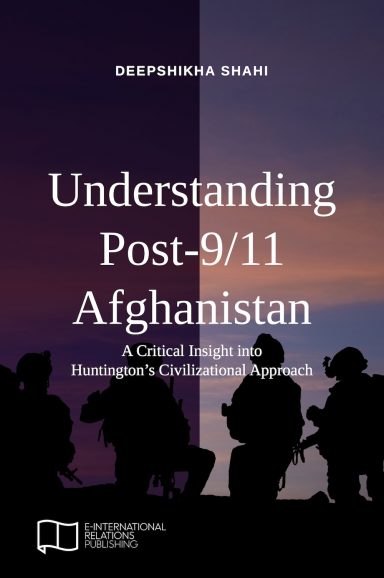9/11 and the subsequent war on terror have misleadingly reinforced the idea of a world politics based on a ‘civilizational’ clash. While post-9/11 Afghan society appears to be troubled with a conflict between so-called Islamic-terrorist and secular-democratic forces, the need for an alternative understanding to pave the way for peace has become paramount. This book uses a critical theoretical perspective to highlight the hidden political and economic factors underlying the so-called civilizational conflict in post-9/11 Afghanistan. It further demonstrates how a post-Islamic humanist discourse has the potential to not only carve the way for peace amidst dangerous entanglement between politics and religion in post-9/11 Afghanistan, but also vindicate Islam of its unjustified denigration in the contemporary world.
Understanding Post-9/11 Afghanistan: A Critical Insight into Huntington’s Civilizational Approach
Deepshikha Shahi is Assistant Professor of Political Science at University of Delhi, India. She is set to pursue post-doctoral research at the Centre for Global Cooperation Research (Käte Hamburger-Kolleg), University of Duisburg-Essen, Germany. She is also affiliated with International Democracy Watch in Italy and Transnational Institute in Amsterdam. Her recent publications include ‘Engaging with the post-secular moment in post-9/11 Afghanistan: the search for a “humanist” political discourse’, Cambridge Review of International Affairs and ‘Rethinking the absence of post-Western International Relations theory in India: “Advaitic monism” as an alternative epistemological resource’, European Journal of International Relations.
Table of contents
THE CLASH OF CIVILIZATIONS THESIS: A CRITICAL APPRAISAL
HUNTINGTON AMONGST THE AFGHANS: REVISITING THE CLASH OF CIVILIZATIONS THESIS AFTER 9/11
CRITICAL INTERNATIONAL THEORY: A COMPARATIVE ADVANTAGE FRAMEWORK
AN ALTERNATIVE UNDERSTANDING OF POST-9/11 AFGHANISTAN: THE CRITICAL-THEORETICAL PERSPECTIVE
